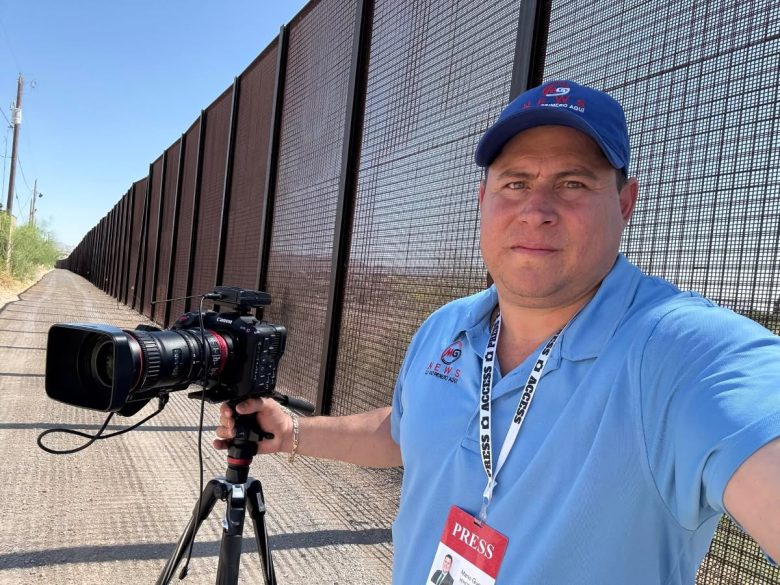Mario Guevara, the Salvadoran journalist detained last month after filming a protest in DeKalb County, has now had all local criminal charges against him dropped. But he remains behind bars in federal custody—and may still face deportation.
⚖️ What We Know: Gwinnett County Solicitor-General Lisamarie Bristol announced Wednesday that all three misdemeanor charges filed by the sheriff’s office in June have been dismissed. Guevara had faced reckless driving, failure to obey traffic signs, and using a phone while driving.
Two of those charges were dropped because the incident happened on private property. Prosecutors say Georgia traffic laws only apply on public roads.
The third charge—filming while driving—was also dropped. Though authorities say there was enough evidence for the warrant, Bristol’s office found it did not meet the higher standard needed for a conviction.
📄 In Her Words: “While there was probable cause to support the issuance of warrants,” Bristol said, “there is insufficient evidence to obtain a conviction beyond a reasonable doubt.”
She added that her decision was based solely on the law—not politics or public pressure.
🕵️ What We Don’t Know: Guevara is still being held by immigration officials.
Despite a judge granting bond last week, federal prosecutors appealed, freezing that order. Guevara’s legal team has not commented on whether they will now renew their motion for release.
🌎 Why It Matters: Guevara’s arrest—and continued detention—has sparked outcry across press freedom and immigrant rights circles. He says he was targeted for his reporting, not for breaking any laws. Prosecutors in both DeKalb and Gwinnett counties have now dropped every local charge against him.
✊ By The Numbers:
- 3 charges dismissed
- 22 years in the U.S.
- 1 U.S.-born son with special needs
- 5 jails in 4 weeks
📚 In Context: Guevara was arrested on June 14 while covering a protest in DeKalb County. His press badge was visible, and he wore a vest labeled “PRESS.” Charges in DeKalb were dropped last month. The Gwinnett charges were filed shortly after—and now, they’re gone too.
Still, he remains in ICE custody with no clear timeline for release. Guevara has lived in the U.S. legally since 2004 and has a pending green card application.
📌 What’s Next: Guevara is calling on the government of El Salvador—his home country—to intercede. He made a public appeal to President Nayib Bukele earlier this week, asking for help securing his release.
📜 The First Amendment: “Congress shall make no law respecting an establishment of religion, or prohibiting the free exercise thereof; or abridging the freedom of speech, or of the press; or the right of the people peaceably to assemble, and to petition the Government for a redress of grievances.”
What Does it Mean: The First Amendment protects five big freedoms that everyone in the United States has.
These are the five freedoms:
- Freedom of Religion — You can believe in any religion you want, or not believe in any religion at all. The government can’t force you to believe something or punish you for your beliefs.
- Freedom of Speech — You can say what you think and share your ideas, even if others don’t agree with you without the threat of retribution from the government.
- Freedom of the Press — Newspapers, TV, websites, and reporters can share news and opinions without the government telling them what to say.
- Freedom to Assemble — You can gather in groups to protest, march, or meet peacefully to talk about things you care about.
- Freedom to Petition the Government — You can ask the government and government representatives to fix problems or make changes by writing letters, starting petitions, or speaking out in public.
In short, the First Amendment makes sure you can have your own thoughts, share your ideas, and stand up for what you believe — as long as you do it peacefully.
🛑 🛑 🛑
Before You Dismiss This Article…
We live in a time when information feels overwhelming, but here’s what hasn’t changed: facts exist whether they comfort us or not.
When A&W launched their third-pound burger to compete with McDonald’s Quarter Pounder in the 1980s, it failed spectacularly. Not because it tasted worse, but because customers thought 1/3 was smaller than 1/4. If basic math can trip us up, imagine how easily we can misread complex news.
The press isn’t against you when it reports something you don’t want to hear. Reporters are thermometers, not the fever itself. They’re telling you what verified sources are saying, not taking sides. Good reporting should challenge you — that’s literally the job.
Next time a story makes you angry, pause. Ask yourself: What evidence backs this up? Am I reacting with my brain or my gut? What would actually change my mind? And most importantly, am I assuming bias just because the story doesn’t match what I hoped to hear.
Smart readers choose verified information over their own comfort zone.

B.T. Clark
B.T. Clark is an award-winning journalist and the Publisher of The Georgia Sun. He has 25 years of experience in journalism and served as Managing Editor of Neighbor Newspapers in metro Atlanta for 15 years and Digital Director at Times-Journal Inc. for 8 years. His work has appeared in several newspapers throughout the state including Neighbor Newspapers, The Cherokee Tribune and The Marietta Daily Journal. He is a Georgia native and a fifth-generation Georgian.


